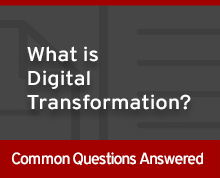Digital transformation. It's the latest buzzword for both IT and business leaders, and something most enterprise CIOs — and CEOs — believe they need. In an IDC survey, two-thirds of CEOs said they intended to focus on digital transformation this year. Yet most companies fail to create the transformation they're hoping for.
The reason is that digital transformation requires a permanent and enterprise-wide change in mindset and approach, and not just in the technology you deploy, according to Mike Giresi, who has been CIO at Royal Caribbean Cruises Ltd. for just over a year. In part one of a two-part interview, he explains what digital transformation means at Royal Caribbean Cruises and how most companies get it wrong.

The Enterprisers Project (TEP): A lot of CIOs and tech experts talk about the need for digital transformation. What does that really mean?
 Giresi: A lot of effort is put into activating digital transformation as a project — how do we share and collect data and how does someone traverse and intersect with the brand? But they don't think about all the processes and key performance indicators (KPIs) that aren't lined up to that. So you somehow wind up with an IT project much like other IT projects.
Giresi: A lot of effort is put into activating digital transformation as a project — how do we share and collect data and how does someone traverse and intersect with the brand? But they don't think about all the processes and key performance indicators (KPIs) that aren't lined up to that. So you somehow wind up with an IT project much like other IT projects.
Instead, you need to come up with a whole new way of working. This is why so many organizations struggle with this concept of digital. There's not a single definition, and there's no one way to do it.
TEP: How is digital transformation taking place at Royal Caribbean Cruises?
Giresi: We have been traditionally focused on converting someone to making a reservation and getting guests on our ships. We started asking, how do we create a genuinely immersive vacation that is curated and personalized, so it feels authentic to you, and you can take this experience and share it in a way that is self-branded and goes far beyond the traditional concept of a cruise?
TEP: How is Royal Caribbean Cruises answering that question?
Giresi: We are taking everything from a reservation to a shore excursion to buying a product and modernizing it so it can be executed in a mobile and self-driven way. It's like moving from the concept of having booking funnels to almost being an e-commerce business. It means going through the same evolution that hotel chains and airlines have had to go through.
We have to deliver new capabilities to our reservation system and make data a key strategy and asset that will flow through our organization and arrive when a guest needs it to arrive. Today our systems are set up so that, depending on the service you want, you may have to log out and log back in. You may wind up entering the same data multiple times.
TEP: What are the most important elements of the digital transformation at Royal Caribbean Cruises?
Giresi: When I started, we had to do three things. First, we had to stabilize our production operation — we were having way too many outages. Next, we had to truly integrate with the business. We were not aligned with our core colleagues. The third thing was that everything we were going to do had to be done with a digital and mobile mindset.
TEP: So you are taking a mobile-first approach?
Giresi: We are, but creating the mobile interface is only a small part of it. The hardest part has been dealing with our back-end infrastructure built over many years that was sustaining our business but could not continue to do so in its current format.
When I joined the company, the plan was to rewrite our entire system. I said, "It will take 10 years, and it's not going to work." Our strategy now is simple: We're looking at the back-end infrastructure, and we're trying to decouple some of these systems. So many services have been built to call on too many parts of our system. These are things like pricing and payment and inventory — things that are more like services. If you look at it from that perspective, you can move much faster than if you try to rewrite the entire system.
TEP: So it sounds like you are moving from a waterfall to an agile or DevOps approach?
Giresi: When I arrived, the majority of our organization was still waterfall, and we've adopted a DevOps environment for the majority of our new systems. We are in the process of adopting agile in Espresso which is our B2B site, and we're about to do it for our core reservations system. And the change isn't, "Let's put a different project in place." We're no longer talking about owning a system; we're looking at output and capabilities and benefits.
For example, what has to happen for a successful embarkation process? Now let's map the technology to that process and develop a whole new way of doing this that truly makes it exceptional for our guests. You can't do it if you keep the same teams in the same structure with the same leadership. And so we've gone through a complete change of leadership.
It wasn't fun; on the other hand, the cruise business has not seen a tremendous amount of change over the last couple of decades. That brings in an inherent level of complacency, whether you want to admit it or not. But now people are spending less on products and more on experiences. Experiences are evolving, and people want them to be self-branded, which is curated. Find me something that feels right for me.
I think that concept is going to drive some very significant change in our industry. We will see it, particularly as the generations continue to evolve and the people in our primary target market evolve. Preparing for that is probably the most important thing we need to do today in our business.
TEP: Any final advice for other CIOs who are undertaking digital transformation?
Giresi: I think that culture is a key determinant of successful digital transformation. We can change our technologies, our infrastructure, and our processes. But without addressing the human element — and making these shifts within the context of the organization's culture — bona fide and lasting change will not happen. It's important for IT leaders to understand the business's current culture to map the right solution and timeline that will work for that business. No two organizational cultures are the same.





